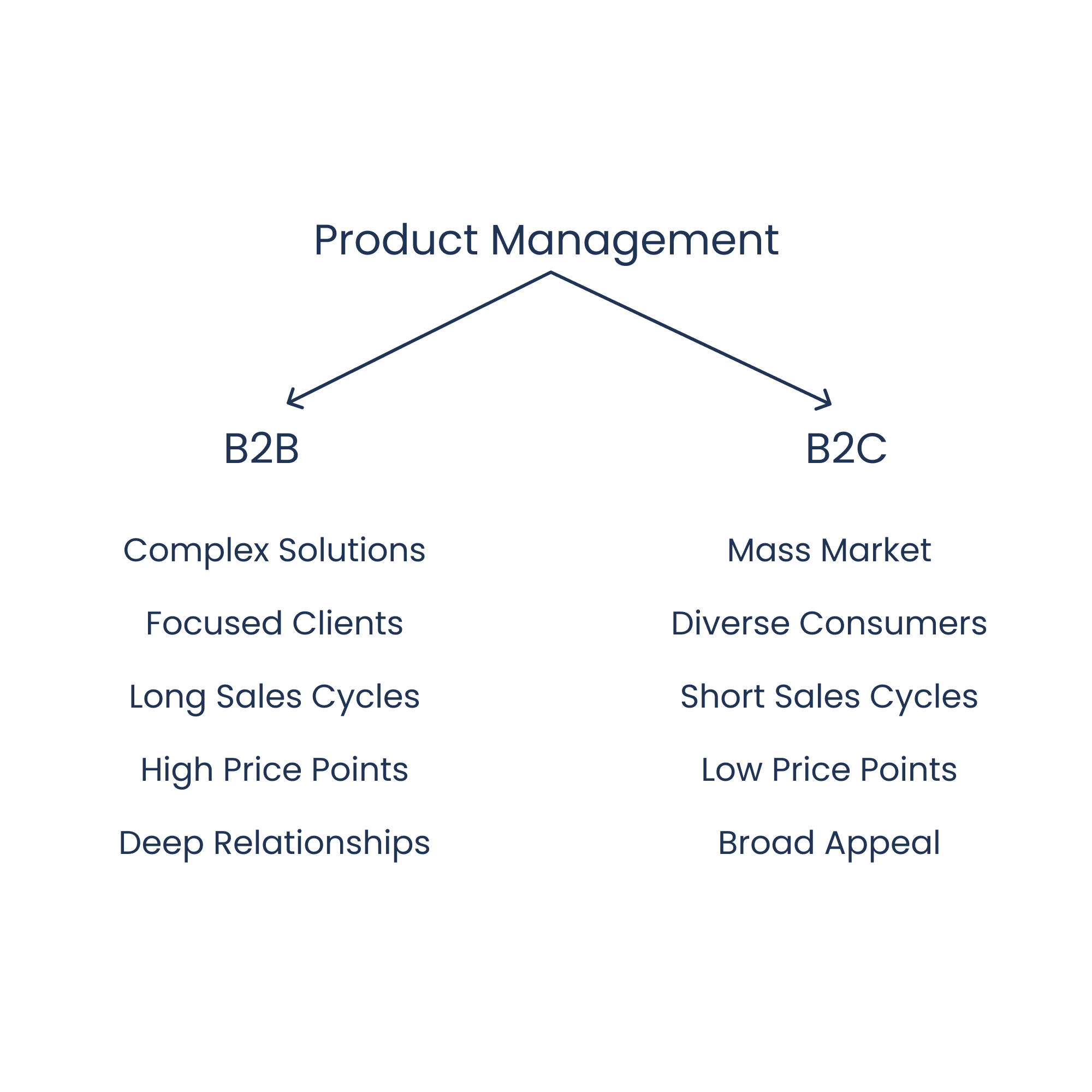
Do you have a passion for product management but can’t decide whether to pursue a career in the business-to-business (B2B) or business-to-consumer (B2C) space? Look no further! This comprehensive guide will explore the key differences between B2B and B2C product management, providing valuable insights to help you determine which path best suits your interests and strengths. So, buckle up and get ready to dive into the fascinating world of B2B and B2C product management!
Understanding B2B and B2C Product Management
Before delving into the differences between B2B and B2C product management, it’s essential to understand the two sectors.
- B2B Product Management: In the B2B sector, companies primarily sell products or services to other businesses. These products often cater to a company’s specific needs, addressing complex problems with customized solutions. B2B product managers deal with longer sales cycles, smaller customer bases, and higher price points.
- B2C Product Management: In the B2C sector, companies sell products or services directly to end consumers. These products are typically designed for mass-market appeal, with a focus on simplicity and user-friendliness. B2C product managers cater to larger customer bases, face shorter sales cycles, and have lower price points.
Key Differences Between B2B and B2C Product Management
Target Audience and Market Size
B2B product managers work with a more focused target audience: other businesses. This often results in a smaller customer base compared to B2C product managers. Consequently, B2B product managers must develop deep relationships with their clients, understanding their unique needs and pain points to tailor solutions accordingly.
On the other hand, B2C product managers cater to a much larger customer base, which can be more diverse and challenging to satisfy. This requires a broader understanding of customer preferences and the ability to create products that appeal to various demographics.
Product Complexity and Customization
B2B products are typically more complex and specialized, requiring in-depth knowledge of the industry, technical expertise, and the ability to manage intricate development processes. B2B product managers must also handle higher levels of customization to address the specific needs of each business client.
B2C products, however, are usually designed with simplicity and ease-of-use in mind. B2C product managers prioritize creating a seamless, intuitive user experience that can be quickly adopted by a wide range of consumers.
Sales Cycle and Decision-Making Process
B2B product managers face longer sales cycles due to the complex nature of their products and the involvement of multiple stakeholders in the decision-making process. It’s crucial for B2B product managers to navigate this intricate process, often collaborating with sales teams to ensure successful product adoption.
In contrast, B2C product managers deal with shorter sales cycles and more impulsive consumer buying behavior. They must focus on creating compelling marketing campaigns and optimizing the purchasing process to drive sales and customer satisfaction.
Pricing and Revenue Model
B2B products often come with a higher price tag, reflecting their complexity and customization. This requires B2B product managers to develop sophisticated pricing strategies that account for factors such as product development costs, customer value, and competitive positioning.
B2C products typically have lower price points, demanding a more volume-driven approach to generate revenue. B2C product managers must strike the right balance between affordability and profitability, while also considering promotional pricing and discount strategies.
Strategies for Success in B2B and B2C Product Management
B2B Product Management Strategies
- Develop deep industry knowledge: Stay abreast of industry trends, understand the competitive landscape, and establish yourself as an expert in your domain.
- Cultivate strong relationships: Build lasting connections with clients and stakeholders to foster trust and loyalty. This can lead to long-term partnerships and recurring revenue.
- Collaborate with sales teams: Work closely with sales teams to identify target customers, refine value propositions, and support successful product adoption.
- Focus on ROI: Demonstrate the return on investment (ROI) of your product to clients, highlighting its potential to solve their problems and create value for their business.
B2C Product Management Strategies
- Prioritize user experience: Deliver a seamless, intuitive experience to captivate users and encourage repeat usage.
- Leverage data and analytics: Analyze customer behavior, preferences, and feedback to inform product improvements and marketing strategies.
- Iterate quickly: Adopt a rapid experimentation mindset to test, learn, and optimize your product based on customer feedback and market response.
- Build a strong brand: Craft a compelling brand story that resonates with your target audience and differentiates your product in a crowded market.
Choosing the Right Path for You
Determining whether B2B or B2C product management is the right fit for you depends on your interests, strengths, and career aspirations. Consider the following factors when making your decision:
- Passion for the industry: Identify the industries that excite you and determine whether they primarily cater to businesses or consumers.
- Skillset alignment: Assess your technical expertise, problem-solving abilities, and relationship-building skills to determine which type of product management is better suited to your strengths.
- Growth opportunities: Evaluate the potential for career growth and personal development in each sector, considering factors such as job stability, salary expectations, and company culture.
Conclusion
Both B2B and B2C product management offer unique challenges and rewards, providing ample opportunities for growth and fulfillment. By understanding the key differences between these two paths and aligning your passion, skills, and goals with the right sector, you can set yourself up for a thriving career in product management. Whichever path you choose, remember that success in product management requires continuous learning, adaptability, and the relentless pursuit of customer satisfaction. Embrace the journey, and you’ll be well on your way to becoming an exceptional product manager in your chosen field!



